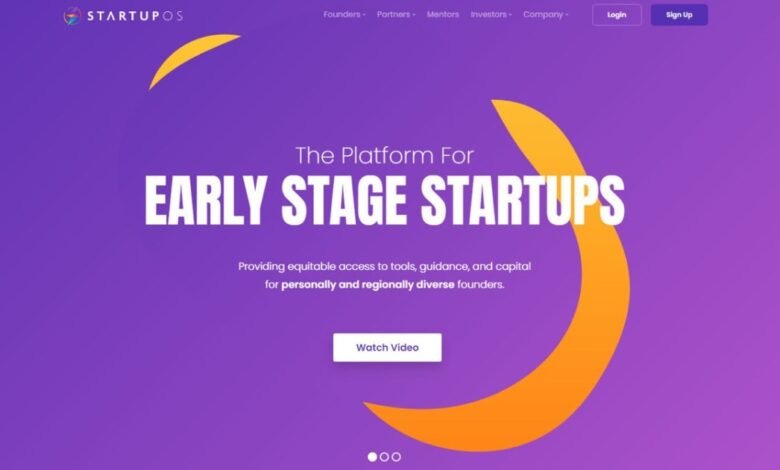StartupOS launches what it hopes will be the operating system for early-stage startups

Running a startup can be a chaotic time; a million things need to be built, made, tracked, analyzed, considered, reported and validated. Keeping an overview of everything can be difficult, and there’s always the threat that something (maybe something important?) will slip away. HomeOS today launched a platform to bring a bit of sanity to everything in a bid to help founders stay on track.
The platform was built in partnership with (and backed by) SVB, the parent company of Silicon Valley Bank. It includes access to business tools, guidance, mentors, and investors, with the hope that founders can learn how to best guide their startups through the process of validating ideas, creating MVPs, and finding products that are right for the market.
The company is headed by CEO and co-founder Paul Pluschkell, who has spent the last quarter century building startups and has several successful exits under his belt, including MXNet, IXnet, Spigit, Global Center, and Kandy.
“One of the main reasons startups are successful is because from the beginning of their journey they were given access to the tools, funding sources, and network needed to support the growth of their business,” shares Pluschkell in a statement to TechCrunch. “Unfortunately, however, not all founders have the same level of empowerment and support due to their background or geographic location. Through StartupOS, we aim to change that.”
Early next year, the company will add the ability to connect to an investor network, making StartupOS a source of early-stage deal flow for angels and interested investors.
StartupOS’ stated mission is that it “aims to dramatically increase the total number of startups and their likelihood of success for new and diverse generations of founders.” Which sounds good. However, as a middle-aged guy with 20+ years of work experience, I feel qualified to level this little critique: It feels a bit rich to have “diverse founders” as a stated goal when press reports feature three people from middle age. guys – Mr. Pluschkell (CEO), Mr. Wagner (Head of Business Development) and Mr. Dhillon(COO) — with more than 20 years of work experience. Adding a woman or fresher blood to the team might have been a nice touch. When I challenged the StartupOS team at their Top of the Pyramid sausage fest, the company was not entirely on board.
“We have a diverse leadership team. In fact, approximately 50% of StartupOS senior executives are diverse, including women and minorities. Our platform was set up so that startups that traditionally wouldn’t have the opportunity to be mentored/invested through accelerators can now have a more direct path to success,” said Pluschkell. “This will be a huge advantage for minority-owned businesses that have previously had trouble getting the funding they need to grow. We are proud of the diversity in our leadership team and will continue to hire the best talent, regardless of race, religion, gender and creed.”
Paul Pluschkell, Founder and CEO of StartupOS.
Interestingly, neither the press materials nor the site itself says anything about what the platform is considering as its business model, which made me a bit suspicious – from the screenshots it appears that the platform is collecting Lots of very valuable data on the various startups, and the old adage is true: if you’re not paying for the product, you are the product. Digging a bit deeper, the team shed some light on the roadmap:
“We have a multi-tiered business model that focuses on the demand side. Startups are free on our platform,” explains Pluschkell. “We will offer a subscription-based service that gives opportunity providers (VCs, accelerators, educational institutions, corporations, etc.) a dashboard for enrolled StartupOS companies or portfolios to view, filter, create watchlists, and connect with startups. on our Platform. We have a sponsorship and referral model that allows ads on our site for companies that provide services to start-ups and may provide services at a discount.”
The company also has a “PowerUP Builder” that allows companies to create PowerUPs (tools that provide hands-on learning exercises) that work within our platform and create initial awareness by offering a lightweight version of their business tools for startups. The idea is that this is lead generation, with the hope that startups will sign up for business services once they raise funds and continue on their growth trajectory.
“Later next year, we plan to offer a Data Subscription which is aggregated and anonymous data about certain industries, geographies, business models, and stages of a company’s life cycle,” says Pluschkell. “For example, a corporate customer in financial services with a StartupOS data subscription can access average revenue growth, cash consumption, etc. of pre-Series financial services startups”.
The StartupOS terms and conditions were buried at the bottom of the site’s FAQ .
I wanted to dig a little deeper and found that the site’s privacy policy and Terms and Conditions aren’t where you’d expect to find them. Instead, they were buried at the bottom of the FAQ. In any case, the T&Cs highlight that all content (“all information, data and other content, in any form or medium, that is collected, downloaded or received, directly or indirectly, from you […] by or through our Service”) that you upload to the site may be shared with other users of the site in perpetuity, and “Further, you grant (…) an irrevocable, perpetual, transferable, sublicensable (through multiple levels), fully paid, royalty-free right.” , and worldwide right and license to use, copy, store, modify, distribute and display Your Content”.
Given the amount of startup information that can be proprietary, I’d probably think twice about handing over a bunch of my startup information to StartupOS.
I wonder if, given the incredible variety of startups and the needs of various founders, StartupOS can be as useful as it sets out to be. SaaS companies can often play with a similar playbook, but hardware companies or companies that operate in regulated spaces (fintech, medtech, etc.) often have a lot of variety in terms of what the “stick” represents. long in the store”. It will be interesting to see if the platform can attract new companies and if it can help them in a way that ends up being efficient.
In any case, StartupOS is one to keep an eye on as you pick up your first startups and start proving your thesis.






